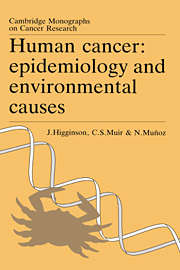Book contents
- Frontmatter
- Contents
- Contributors
- Preface
- Acknowledgements
- Historical introduction
- PART I Epidemiological methods
- PART II Causative factors in human cancer
- 6 The concept of cause: epidemiological considerations
- 7 Chemical factors
- 8 Occupational factors
- 9 Cultural factors: tobacco
- 10 Cultural factors: alcohol
- 11 Sexual behavior and reproductive factors
- 12 Nutritional factors
- 13 Physical factors: fiber carcinogenesis (including crystalline silicates)
- 14 Physical factors: implants and thermal chronic injury
- 15 Physical factors: ultraviolet (UV) light
- 16 Ionizing radiation
- 17 Biological causes
- 18 Genetic and other host-risk factors
- 19 Socio-economic factors
- PART III Legal and ethical considerations
- PART IV Introduction: total and specific site epidemiology
- PART V Buccal cavity
- PART VI Digestive system
- PART VII Respiratory system
- PART VIII Bone and soft tissue
- PART IX Skin
- PART X Breast and genitourinary system
- PART XI Eye and nervous system
- PART XII Thyroid and other endocrine glands, lymphoid and hematopoietic system
- PART XIII Cancers in children and multiple primary cancers
- Conclusions
- Appendix 1 Cancer statistics
- Appendix 2 A glossary of epidemiological terms
- Appendix 3 Acronyms and abbreviations
- Supplement
- Index
17 - Biological causes
Published online by Cambridge University Press: 03 May 2010
- Frontmatter
- Contents
- Contributors
- Preface
- Acknowledgements
- Historical introduction
- PART I Epidemiological methods
- PART II Causative factors in human cancer
- 6 The concept of cause: epidemiological considerations
- 7 Chemical factors
- 8 Occupational factors
- 9 Cultural factors: tobacco
- 10 Cultural factors: alcohol
- 11 Sexual behavior and reproductive factors
- 12 Nutritional factors
- 13 Physical factors: fiber carcinogenesis (including crystalline silicates)
- 14 Physical factors: implants and thermal chronic injury
- 15 Physical factors: ultraviolet (UV) light
- 16 Ionizing radiation
- 17 Biological causes
- 18 Genetic and other host-risk factors
- 19 Socio-economic factors
- PART III Legal and ethical considerations
- PART IV Introduction: total and specific site epidemiology
- PART V Buccal cavity
- PART VI Digestive system
- PART VII Respiratory system
- PART VIII Bone and soft tissue
- PART IX Skin
- PART X Breast and genitourinary system
- PART XI Eye and nervous system
- PART XII Thyroid and other endocrine glands, lymphoid and hematopoietic system
- PART XIII Cancers in children and multiple primary cancers
- Conclusions
- Appendix 1 Cancer statistics
- Appendix 2 A glossary of epidemiological terms
- Appendix 3 Acronyms and abbreviations
- Supplement
- Index
Summary
Parasites have been suspected to be causally associated with cancer of the bladder and liver for at least 80 years. A Nobel Prize was awarded to Fibiger for his report in 1913, of a nematode as the cause of gastric cancer in rats, which, unhappily, was later shown to be a misinterpretation of the data.
In contrast, despite the discovery by Rous early this century that viruses could cause neoplasms in animals, systematic work on the possible role of viral agents in human cancer did not begin until mid-century with recognition of the Bittner factor in milk in mammary cancer in mice and the vertical transmission of certain murine leukemias.
Viruses and cancer
Hepatocellular carcinoma (HCC) (Chapter 29)
Earlier studies linking liver cancer and hepatitis, although suspected since the 1940s, were handicapped by lack of techniques to identify the virus.
The extensive epidemiological and laboratory evidence that has established the presence of a strong and specific association between hepatitis B virus (HBV) and HCC has been reviewed by Szmuness (1978); Blumberg & London (1985); and Munoz & Bosch (1987). A positive correlation exists in most studies between the incidence or mortality of HCC and the prevalence of HBsAg (hepatitis B surface antigen) carriers. However, there are as yet unexplained exceptions such as Greenland Eskimos with a high prevalence of HBsAg carriers and a low incidence rate of HCC (Melbye et al., 1984).
- Type
- Chapter
- Information
- Human CancerEpidemiology and Environmental Causes, pp. 179 - 188Publisher: Cambridge University PressPrint publication year: 1992
- 1
- Cited by



